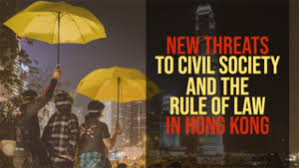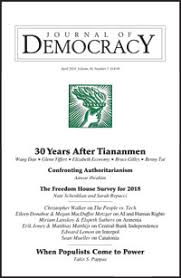Hong Kong’s chief executive, Carrie Lam, said Monday that she had no intention of withdrawing contentious legislation that would allow extraditions to mainland China, despite hundreds of thousands of people demonstrating against it the day before.
“We were doing it, and we are still doing it, out of our clear conscience, and our commitment to Hong Kong,” Ms. Lam told reporters in her first remarks about the demonstration, The Times reports.
 Hundreds of thousands of people protested in Hong Kong (Guardian, HT:CFR) in opposition to a proposed law that would create an extradition system between semi-autonomous Hong Kong and mainland China. Lam denied that the Chinese central government was behind the bill and said the administration would move ahead with efforts to pass it. (This CFR Backgrounder looks at democracy in Hong Kong.)
Hundreds of thousands of people protested in Hong Kong (Guardian, HT:CFR) in opposition to a proposed law that would create an extradition system between semi-autonomous Hong Kong and mainland China. Lam denied that the Chinese central government was behind the bill and said the administration would move ahead with efforts to pass it. (This CFR Backgrounder looks at democracy in Hong Kong.)
The proposed law has enraged Hong Kong residents and alarmed foreign businesses, Hilton Yip writes for Foreign Policy. “If it is passed, this extradition bill will signal the virtual end of Hong Kong not just as a distinct city under One Country, Two Systems, but also as an international business hub, because nobody in Hong Kong would be safe from China’s legal system,” he writes.
 The legislation has been described as possibly China’s worst assault yet on the rule of law by a delegation of Hong Kong democracy advocates who testified before a bipartisan commission and addressed a National Endowment for Democracy forum (below), appealing for the US to take action to stop Hong Kong’s controversial extradition proposal.
The legislation has been described as possibly China’s worst assault yet on the rule of law by a delegation of Hong Kong democracy advocates who testified before a bipartisan commission and addressed a National Endowment for Democracy forum (below), appealing for the US to take action to stop Hong Kong’s controversial extradition proposal.
The delegation – comprising veteran democracy advocate Martin Lee, civil society activist Nathan Law Kwun-chung, veteran journalist Mak Yin-ting and former Legislative Council member Lee Cheuk-yan – highlighted the bill’s chilling impact on political and media freedoms, and on the city’s liberal, open business environment.
 The Hong Kong government should withdraw proposed revisions to two laws concerning extradition, civil society groups said in a joint letter to Hong Kong Chief Executive Lam. The letter was co-signed by 68 nongovernmental organizations that work on a broad range of human rights and social issues in Hong Kong and mainland China.
The Hong Kong government should withdraw proposed revisions to two laws concerning extradition, civil society groups said in a joint letter to Hong Kong Chief Executive Lam. The letter was co-signed by 68 nongovernmental organizations that work on a broad range of human rights and social issues in Hong Kong and mainland China.
China’s ruling Communist Party seems powerful at the moment, but China is at a crossroads, notes Benny Tai, associate professor of law at the University of Hong Kong. The kinds of cultural changes seen in Hong Kong may be coming to China before long, he wrote for The Diplomat, in an essay drawn from an article in the April 2019 issue of the National Endowment for Democracy’s Journal of Democracy.







